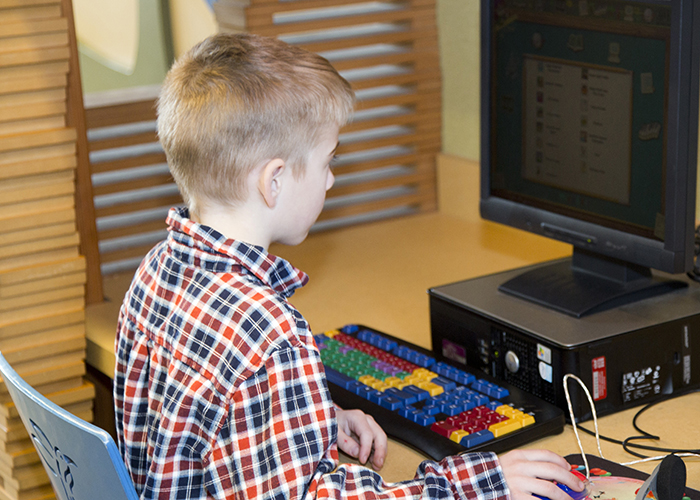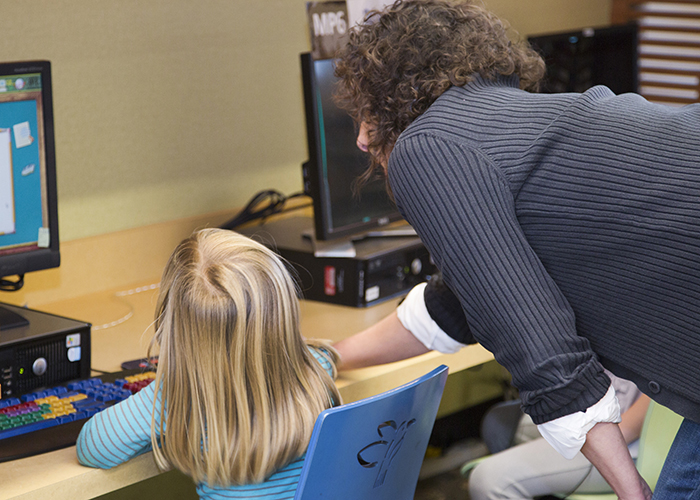Keeping Kids Safe Online
Posted on October 21, 2014 at 6:00 am
By Rachel Edmondson
In the interest of keeping things real, this is a blog post I really didn’t want to write. But as parents, there are so many things we have to do that we wish we didn’t. For me, worrying about Internet safety is one of them. I hate that we live in a world where someday my children could be in my house, I could be in the same room, and they might still be in danger. This day would be today, except my kids are young enough that our version of Internet safety is to not let them on the Internet at all. Someday soon, though, that will no longer be an option. So, while sometimes I’d like to be an ostrich and stick my head in the sand, I decided to celebrate Cyber Security Awareness Month by preparing myself for the day when I will let my children brave the wild blue yonder of the Internet.
I started mission “Internet Safety” by taking a look online at the resources provided by the Department of Homeland Security as part of Cyber Security Awareness month (isn’t it slightly ironic that I went online to learn how to be safe online?) There is a wealth of resources on this site, and almost all of the facts and tips in this blog came from the Parent and Educator resources they provide.
What I first discovered was affirmation that learning about Internet safety and teaching it to my kids really is a critical part of their education. Some of the statistics were startling. For instance, on average, kids 10 and older spend 6 hours a day online (while their parents estimated that they spend 4 hours online.) With that much time online, kids are bound to encounter sticky situations. Of course, kids’ access to the Internet is becoming even more widespread and mobile. My idea of being near my kids while they use the Internet goes out the window as soon as they own a smart phone, tablet, or eReader with Internet accessibility. Our job as parents is getting tougher when it comes to monitoring our children’s Internet use. In fact, 74% of parents admit they don’t know about their children’s online behavior, and 46% of youth say they would change their online behavior if their parents were paying attention. So what exactly are the dangers kids are facing online? Some of the most common issues kids face are cyberbullying, cyber predators, and identity theft.
Cyberbullying is exactly what it sounds like—somebody goes online and posts something mean-spirited about somebody else. The difference is that cyberbullying can happen any time of the day and messages and images can be distributed widely and spread fast. Also, once these messages and images are posted they are almost impossible to delete. To make it worse, cyberbullies can do this all anonymously. Studies show that 7 in 10 young people are victims of cyberbullying. So, what should parents do? According to www.stopbullying.gov the first step is knowing what your kids are doing online and what sites they are frequenting. Ask for their passwords and let them know you’ll only use them in case of emergency. Let your kids know you are going to friend and follow them on social media sites, but that you won’t embarrass them by commenting, you’ll just be watching to make sure they are safe. Encourage your kids to let you know if they, or somebody else, are being cyberbullied and make sure they know you won’t take away their computers or cell phones if they confide in you. Also, have a conversation with your kids about what they put online. Remind them to think about what they post before they post it. How would they feel if somebody posted something similar about them? How would they feel if a friend shared what they posted with somebody else?
As if cyberbullying wasn’t bad enough, we also need to be concerned with cyber predators. These are people who search online for other people in order to use, control, or harm them in some way. One sobering statistic from the McAfee Digital Deception Study (2013) states that, “One in five U.S. teenagers who regularly log on to the Internet say they have received an unwanted sexual solicitation, and only about 25% tell a parent or adult about it.” Parents need to talk with kids about what is ok and not ok to share online. Tell kids never to share their address, phone number, names of family members, or the school they attend. Make sure they know it is not safe to befriend somebody online that they do not know. Also, review security and privacy settings for the websites your children use.
I think most adults are aware of online identity theft, and find the possibility frightening. What you may not know is that your children are also at risk. In fact, 56% of reported misuse of a social security number is for children. Preventing identity theft for your children is the same as preventing it for yourself. Help your child pick safe passwords and remind them not to use the same password on multiple sites. Also, passwords should be changed often. Make sure they know not to open emails from strangers and not to click on links for unfamiliar sites.
As a result of challenging myself to blog about this topic, I discovered there is a wealth of great information out there. However, even after finding the facts and tips above, I still wasn’t sure how to approach this subject with my kids. Then I found a great publication called “Chatting with Kids About Being Online.”
It talks about Internet safety for kids of different ages, ways to protect your kids across different platforms (computer, smart phone, etc.) and has a glossary that will help those non-tech-savvy parents communicate with their kids who are growing up in a technology-saturated world. Most importantly, it helps parents know how to start the conversation. If you take away nothing else from this blog post, I hope you will print out this publication, read it from cover to cover, and start the conversation with your kids. Our kids’ safety depends on us.
Tags: cyberbullying, internet safety, kids, safety



